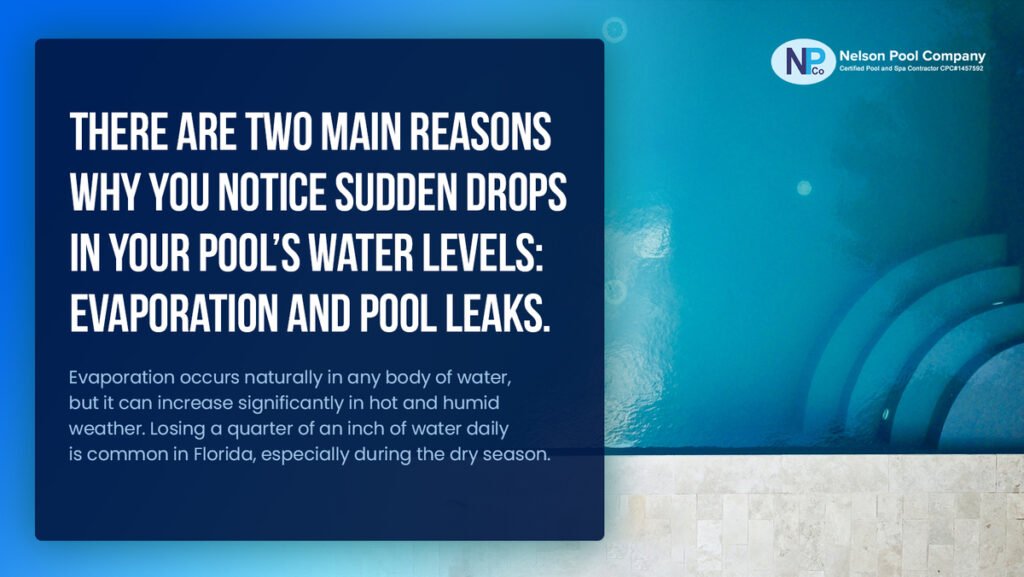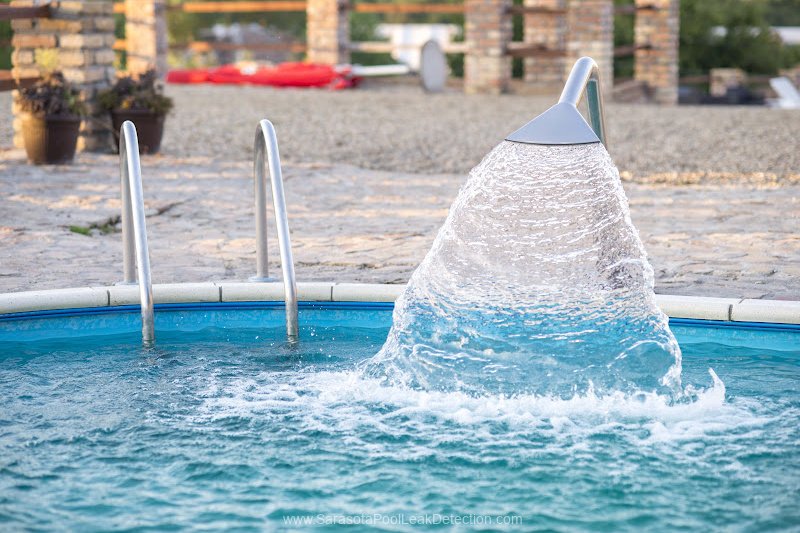Having an inground swimming pool is all fun and games until you notice that it’s starting to lose water.

There are two main reasons why you notice sudden drops in your pool’s water levels: evaporation and pool leaks.
Evaporation occurs naturally in any body of water, but it can increase significantly in hot and humid weather. Losing a quarter of an inch of water daily is common in Florida, especially during the dry season.
Water loss in your pool can indicate a more serious issue that needs assessment by a pool professional: pool leaks. Inadequate pool maintenance can cause cracks and deterioration of pool equipment and plumbing.
It’s possible to confirm the cause of pool water loss with the bucket test and the dye test. When not addressed immediately, leaks can damage the pool structure and cause equipment failure.
In this article, learn more about the causes of water loss in Florida pools. You’ll also find helpful guides on how to detect pool leaks.

How Much Pool Water Loss Is Normal?
Pools typically lose 3 to 7 millimeters of water daily due to evaporation.
In Florida, it is customary to see at least a quarter-inch of water loss during the dry season from October to May. This evaporation rate is equivalent to about:
- 60 gallons of water loss in a 14 x 28-meter pool
- 125 gallons of water loss in a 20 x 40-meter pool
Heated and inground pools with additional features like fountains and waterfalls evaporate faster.
If your pool loses more than an inch of water daily, you can suspect a pool leak in the plumbing, tiles, skimmer, and filter.
In the next section, get a better understanding of the two leading causes of pool water loss.
Top Reasons Why Your Inground Pool is Losing Water
Please include attribution to https://sarasotapoolleakdetection.com with this graphic.
Below are the significant reasons for an inground pool to lose water:
1. Evaporation
Evaporation is a natural occurrence in any body of water.
Water loss due to evaporation is even more noticeable in locations with warmer climates like Sarasota, Florida. Florida has one of the mildest winters, and the weather is typically warm and sunny year-round.
Since heat and weather directly affect evaporation, you’ll notice that the evaporation of pool water is greater during the summer compared to cooler months in the fall and winter. You can suspect a leak if you see alarming water loss during the cooler months.
Here are some of the factors that increase the evaporation rate:
- High outdoor temperatures
- High humidity levels
- Strong winds
- Direct exposure to the sun (without enclosures or shade cover)
2. Pool Leaks
While inground pools are watertight, there are some cases when leaks occur due to broken seals, deteriorating equipment, broken accessories and fixtures, or structural cracks.
If you fail to detect leaks early on, you can lose thousands of dollars due to wasted water, chemicals, and broken equipment. Even worse, water damage can damage your pool’s overall structure.
In this section, find the most common types of leaks in inground pools:
- Tile Leak: It’s common for concrete pools to have cracks around the pool wall. Minor tile leaks can be fixed by patching with epoxy or putty. However, major tile leaks may require replastering and a new layer of tiles. You can learn more about some pool leak sealers here.
- Underground Plumbing Leak: Inground pool leaks are more difficult to detect since plumbing is underground. Sometimes, pool contractors must rip off your pool deck to conduct pressure testing on buried pipes. However, pool services with advanced equipment can use non-invasive methods like ultrasonic detection to find underground leaks.
- Pool Skimmer Leak: Skimmer pool leaks are common in concrete pools. Even if your pool is well-maintained, the natural contraction and expansion of concrete between the pool wall and skimmer cause spiderweb cracks. Leaks around vinyl skimmer faceplates are also common.
- Pool Cracks: Most minor cracks on pool surfaces don’t cause leaks. However, you can use the dye test to confirm leaking in spiderweb cracks. Minor cracks can usually be repaired by filling the gaps with silicone, putty, or plaster. Large and deep cracks are more complicated to fix and may require professional services. Major pool crack repairs will require injected sealants and a new coat of plaster.

Sarasota Guide to Pool Leaks
Here are a few questions to guide you when it comes to pool leaks:
How Do I Confirm if My Pool Leaks?
The bucket test is an easy way to confirm if your pool leaks:
- Place a five-gallon bucket on the second step of your pool. Fill it with enough water to match the pool’s waterline. Mark the waterline on the bucket with a marker or tape.
- Close the pool pump. Leave the bucket for 24 hours.
- Compare the water level in the pool and the bucket. If the water level in the pool is much lower, your pool leaks.
You can learn more about this bucket test here.
How Do I Find the Location of a Pool Leak?
For this, you will need leak finder dye, goggles, and a snorkel. Perform the test on a day with low wind.
- Turn off the pool pump.
- Apply a few drops of the dye to the suspected leak area.
- Watch where the dye flows. Dye naturally flows toward cracks and leaks.
Suspected Leaks in an Inground Pool?
Detecting leaks and figuring out the main culprit of water loss is challenging.
While you can perform the bucket test or the dye test, there are times when you need professional pool service to detect leaks.
Call (561) 570-1269 now, and we will schedule a pool repair and renovation company in your area to reach out to you. They will schedule a time convenient for you to stop by and give you a bid on the repairs.
Or you can fill out this form, and we will have the best pool renovation company in your area contact you!
In case you can not view this video here, please click the link below to view Why Is My Inground Pool Losing Water? | Nelson Pool Company on my YouTube channel: https://youtu.be/cGAnH8AoVtc
